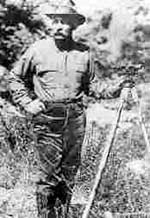
From an excess of material, California and the Dream Seekers (Sunday, January 18; 8 to 10 p.m., and Monday, January 19; 9 to 11 p.m.; A&E) culls four absorbing hours on a golden state of mind, and it’s amazing how many tents we’ve pitched there in dewy expectation of getting rich, or utopian politics, or self-transcendence, or the perfect wave. On the 150th anniversary of statehood for El Dorado, executive producer Thomas Skinner, producer Miriam Birch, and omniscient narrator Edward James Olmos have touched most of the obvious bases, talked to a diversity of historians, and found visuals to educate the eye. Thus: mountains, deserts, oceans, and story-telling architecture; Indians, Hispanics, Anglos, and Chinese; clipper ships and railroads; missionaries and robber barons; aqueducts and motion pictures; table wines and blue jeans; aerospace and microchips; cable cars and earthquakes; oil and oranges. I will presently complain about omissions, but the full story would have needed at least a month – and been, perhaps, less buoyant.
We are asked to think about what archaeological digs can tell us of 300 Amerindian tribes, speaking maybe 125 different languages, who had been around as long as the sequoias when sixteenth-century European explorers first nibbled on the California coast. About Father Serra’s famous missions, and what distinguished them from plantation slavery. About John Sutter’s dream, in New Helvetica, of an agricultural empire, dashed by the discovery of gold and a forty-niner rush of miners that amounted to the greatest voluntary migration in recorded history. About the coolie labor that built the transcontinental railroad and the Alien Exclusion laws that immediately followed the golden spike. About Union Pacific, Wells Fargo, Levi Strauss, and buccaneer businessmen like Mark Hopkins, Leland Stanford, Collis Huntington, and Charles Crocker, each of whom made a huge fortune and even gave a portion of it back, in the form of hush money for universities, libraries, cathedrals, beaches, and hotels. About John Muir and Teddy Roosevelt at Yosemite, Cecil B. DeMille in Hollywood, Charles Lindbergh building the Spirit of St. Louis in San Diego, William Mulholland getting everybody’s feet wet, and John Steinbeck feeling bad on behalf of Okies. About tromping grapes in Sonoma Valley, irrigating arid San Fernando, interning 112,000 Japanese-Americans. About Golden Gates and Boulder Dams.
Never mind that the surprising museums we visit do not include the new Getty. Or that in its emphasis on California as both a rainbow of races and cultures and the fruit bowl of the nation, Dream Seekers never mentions the recent ban on affirmative action, the zoot-suit riots, insurrections in Watts and South Central, or Cesar Chavez and the braceros. If I sound testy, it’s because I grew up there, force-fed a lot of Father Serra in high school, flunking automobile, volleyball, and puberty rite on the beach, ignorant till Chinatown of who made money in the water deal, what Hollywood did to Upton Sinclair when he ran for governor, and why Harry Bridges caused so much trouble on the San Francisco docks.
While the mini-series doesn’t exactly stop at World War II, it does cease to think. Among its omissions are the radical labor history we’ll have to find instead in Thomas Pynchon’s Vineland; the black history that shows up only in the Easy Ed novels of Walter Mosley; the corruption in Los Angeles of record companies, gossip magazines, studios, and police that drives James Ellroy crazy; the recycled Pacific Rim funny money exhumed in such brilliant detail by Mike Davis in City of Quartz, the atom-smashing and the anxiety production at the Lawrence Livermore laboratories that inspires so much dread in Joan Didion. Also absent: the sob stories of such children of the dream factory as Jill Robinson, Brooke Hayward, and Carrie Fisher; the Beverly Hills of Charles Manson; the Oakland of the Black Panthers; the Haight-Ashbury of the hippies and the Diggers, as well as of Dashiell Hammett, Raymond Chandler, and noir; the L.A. of O.J. and the Menendez brothers, gated communities and surfing, the blacklist and the Beach Boys. When we talk, as historian Andrew Rolle does, about a “magnetic” quality and a vibrant “ethos,” we’re also talking about free fall in an unbearable lightness of California being, a space-sickness of transcendence. Dream Seekers is all levitation and no crash.